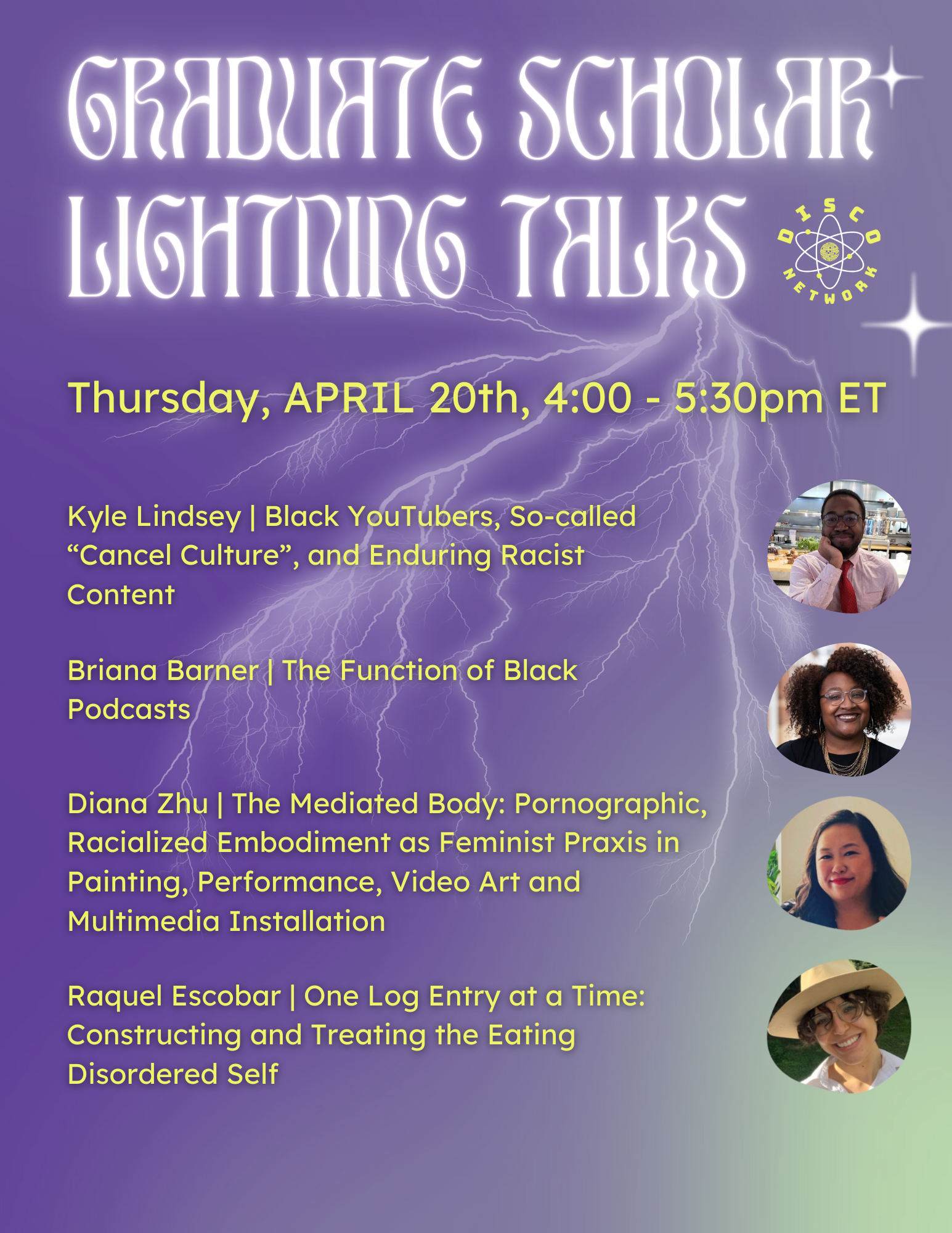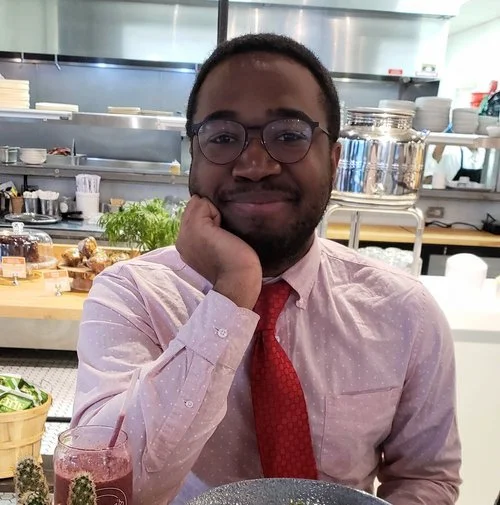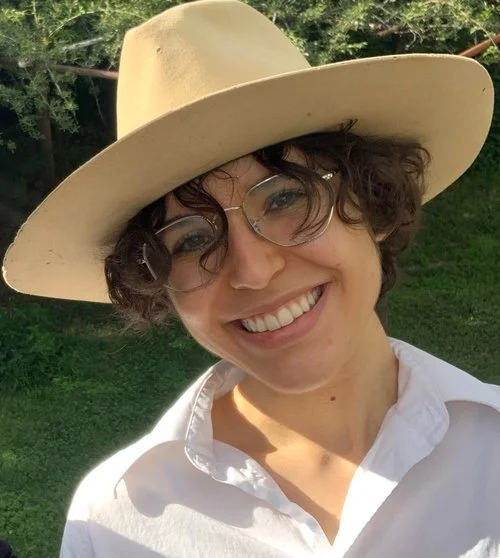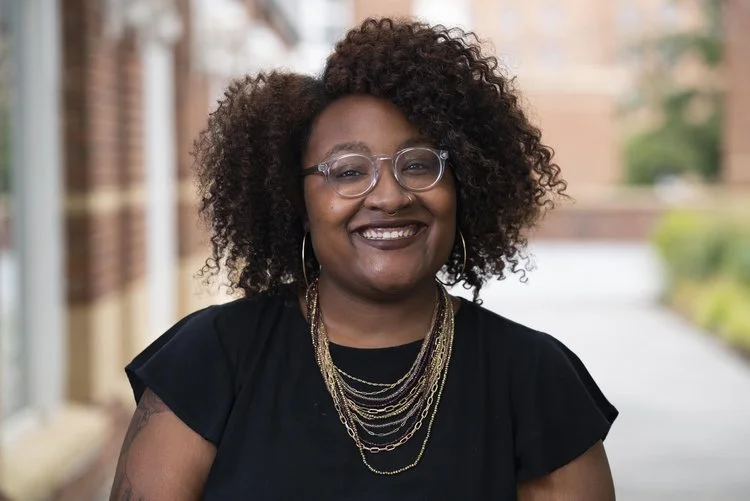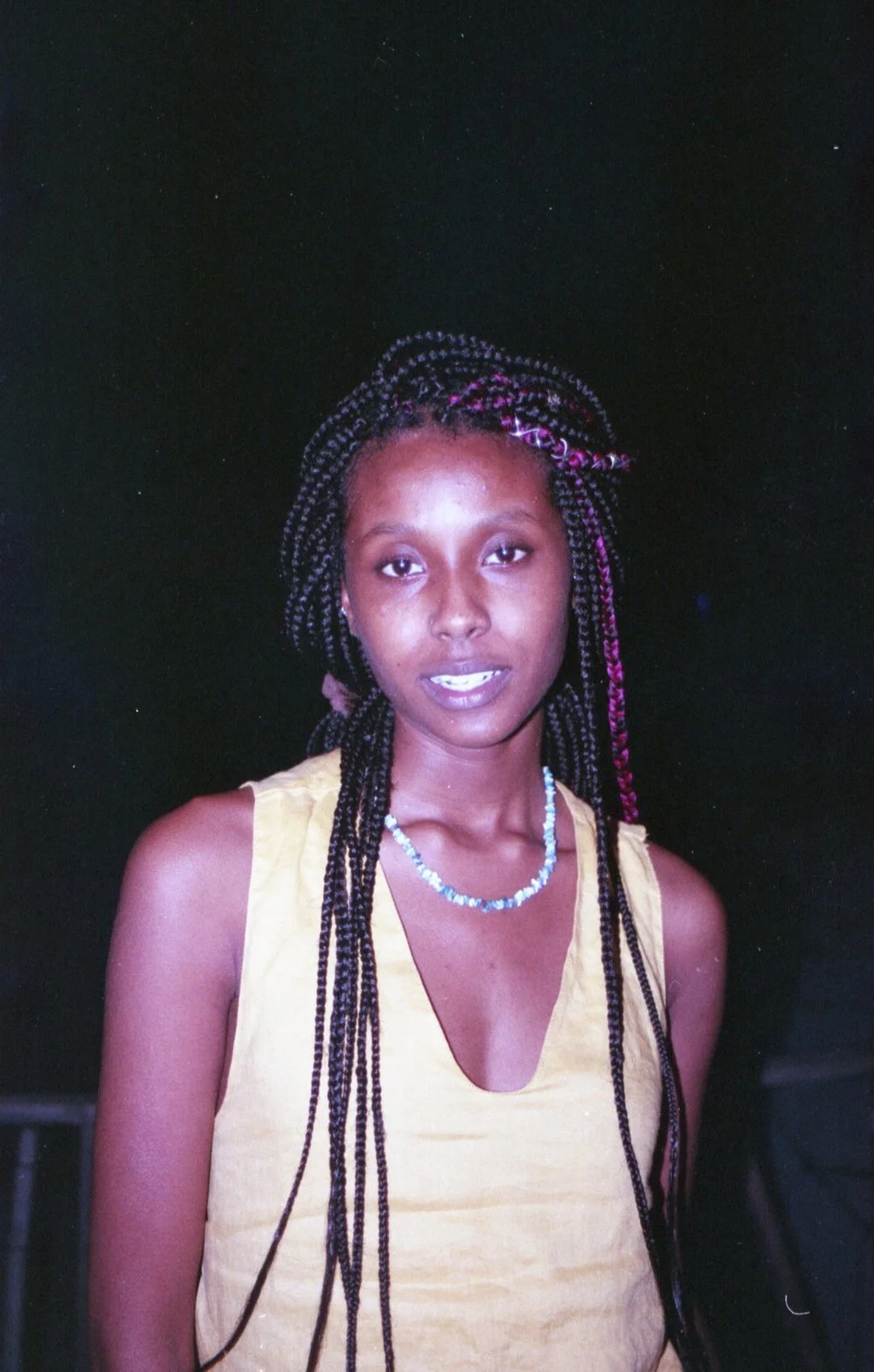A purple background with lightning striking. "Graduate Scholar Lightning talks" in illuminated white text at the top. Yellow text below that reads the names of the scholars with their talk titles. Their headshots are to the right.
Each DISCO Graduate Scholar will give a “lightning talk” on their research affiliated with their DISCO Network lab.
The DISCO Graduate Scholars Program is designed for graduate student researchers committed to developing interdisciplinary work in collaboration with our Co-Principal Investigators and postdoctoral fellows.
Kyle Lindsey (he/him)
Black YouTubers, So-called “Cancel Culture”, and Enduring Racist Content
Kyle Lindsey is a Ph.D. candidate in American Culture with a certificate in Digital Studies from the University of Michigan, Ann Arbor. His research explores how black women and queer content creators buffer both bad faith and violent engagements online to produce viable intellectual and intimate digital communities. In studying this latest generation of cultural producers, he hopes to both explore the state of digital criticism and mark this moment as the latest in a genealogy of black cultural criticism. Lindsey is the co-author of Racist Zoombombing (2021), a monograph co-authored with Lisa Nakamura and Hanah Stiverson and serves as Co-coordinator of the Digital Inequality Lab. Lindsey was a Mellon Mays Undergraduate Fellow at Grinnell College, where he received his B.A. in Gender, Women’s, and Sexuality Studies.
Raquel Escobar (they/them)
One Log Entry at a Time: Constructing and Treating the Eating Disordered Self
Raquel Escobar (they/them) is a second-year PhD student in the Joint Program in English and Women’s and Gender Studies at the University of Michigan. Their research interests include Feminist Disability Studies, queer crip time, Comics Studies, biodata and digital health tools, and speculative embodiment. They have experience as a Graduate Student Instructor in Women’s and Gender Studies, a Program Assistant and Workshop Facilitator for the Engelhardt Social Justice Fellowship, and a Research Assistant to Dr. Petra Kuppers. Their current involvement in the collaborative research project, Dancing and Writing Disability Differently: Non-Realist Embodiment and the Speculative Imagination, led by Dr. Petra Kuppers and Charli Brissey, intertwines with their work as a member of the Digital Accessible Futures Lab.
Briana Barner (she/her)
The Function of Black Podcasts
Dr. Briana Barner is a President’s Postdoctoral Fellow in the Department of Communication at the University of Maryland. She received a doctorate in Radio-Television-Film and a doctoral portfolio in Women’s and Gender Studies from the University of Texas. Briana also earned a Master’s in Women’s and Gender Studies from UT. She is an interdisciplinary critical and cultural communications scholar with research interests in Black podcasts, digital and Black feminism, digital media, social media as a tool for social justice and activism and the representation of marginalized people, specifically Black girls and women, in popular culture and media. Briana is currently at work on several projects, including journal articles and a book manuscript about the cultural production of Black podcasts. Briana is a proud native of the Southside of Chicago and alumna of Bennett College, a small women’s HBCU in Greensboro, NC.
Diana Zhu (she/her)
The Mediated Body: Pornographic, Racialized Embodiment as Feminist Praxis in Painting, Performance, Video Art and Multimedia Installation
Diana Mulan Zhu is a second-generation Chinese-American artist, visual activist, filmmaker, technologist, and scholar living with bipolar disorder who seeks to understand shame, the body, sanity, and the digital gaze through painting, video art, performance, and installation. She reclaims agency by making art as a “queer, psycho, Asian, slut” in order to offer socio-political commentary on gender, disability, race, and gender. She grew up in the Pacific Northwest and studied computer science and studio art at Vanderbilt University. She holds a MA in Media, Culture, and Communication from NYU, where she wrote her thesis on how cyber sexual assault and cable television can mediate each other as virtual violence. She also has over a decade of professional experience working as a technologist at tech and media powerhouses like Microsoft, Intel, NBCUniversal, and Viacom. Diana Mulan Zhu is currently pursuing her MFA in Art at SUNY Stony Brook University. In her practice, she draws on motifs of the diary, fairy tales, pornography, and social media to critique the violation and fetishization of the mentally ill Asian woman’s body.
Josie Williams
Exploring Cyborgian Art Forms through Emerging Technology: An Inquiry About Technology That Let's Us Be More Human
Josie Williams is an afro-nowist, creative technologist, and founder of Algorithmic Equity, an interactive digital platform that empowers any New Yorker to report, record, or respond to law enforcement behavior. She has presented her research on bias in chronic kidney disease prediction modeling at NeurIPS's Fair Health in ML workshop in Vancouver and NYC Media Lab’s Summit in 2019. In 2020, she participated in Afrotectopia’s Imagineer Fellowship and joined the NEW INC Creative Science track. She is also the Black Public Media NCU 2021 Fellow which supports her project, Ancestral Archives, a collection of chatbots modeled after historically-significant BIPOC leaders. Currently, she is an MFA at Stony Brook University where she is also participating in a research fellowship with Stephanie Dinkins at the Future Histories Studio. Her primary interests revolve around artificial intelligence, data equity, cultivating Black radical imagination, and creating sentient-centered AI.
